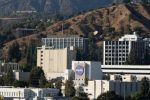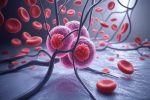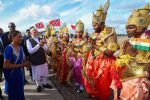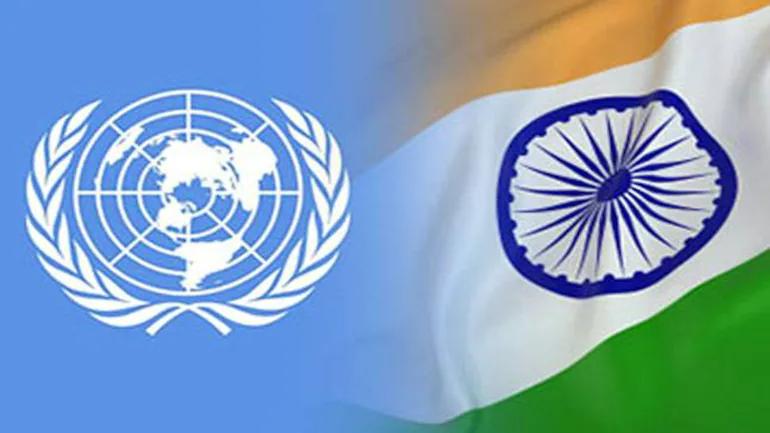The Vice President of India, Shri M. Venkaiah Naidu has said that Prof. M.S. Swaminathan transformative leader who has inspired many scientists to focus on the problem of Indian agriculture. He was addressing the gathering after conferring ‘Yeraringan’ Award to Prof. M.S. Swaminathan, in Chennai today. The Governor of Tamil Nadu, Shri Banwarilal Purohit and other dignitaries were present on the occasion.
The Vice President said that Prof. Swaminathan was a living legend who has done India proud with his extraordinary vision, commitment and pragmatism. He further said that he was truly an iconic figure who has shown to the entire world how research can reach the farms and transform farmers’ lives. He was a man with deep commitment to our country’s development, he added.
The Vice President said that in 1947, Prof. Swaminathan moved to the Indian Agricultural Research Institute (IARI, Pusa) in New Delhi as a post-graduate student in genetics and plant breeding. He further said that he qualified for the Indian Police Service but chose a different career path. Instead of taking leadership positions in the public safety and security domain, he charted out a new path leading to food security for the country, he added.
The Vice President said that India registered significant increase in agricultural production in 1960s consequent upon the adoption of new agricultural strategy and use of high yielding variety seeds and chemical fertilizers. He further said that the programme was a major breakthrough and a turning point in the history of agriculture development in India. Prof. M.S. Swaminathan was at that moment the adviser to the Minister of Agriculture and he had invited Dr. Norman Borlaug to India and worked with him in developing high yielding varieties of wheat.
The Vice President said that Prof. Swaminathan’s vision, foresight, intellectual rigour, and the abilities to connect the research findings with farmers’ concerns have earned him numerous awards. He was a Fellow of many of the leading scientific academies of India and the world, including the Royal Society of London and the US National Academy of Sciences, he added.
Following is the text of Vice President’s address:
“It’s my privilege to be a part of this auspicious award ceremony in which we celebrate the outstanding achievements of one of our country’s greatest scientists, Prof. M.S. Swaminathan.
Dr. Swaminathan is a living legend who has done India proud with his extraordinary vision, commitment and pragmatism.
It is quite appropriate that he is being conferred the award of YERARIGNAR, the Icon of Farm Research by four institutions. He is truly an iconic figure who has shown to the entire world how research can reach the farms and transform farmers’ lives.
I have known Prof. M.S. Swaminathan for a long time. He is a man with deep commitment to our country’s development. He is a transformative leader who has inspired many scientists to focus on the problem of Indian agriculture. It is not surprising that he did what he did and excelled in everything he did.
His commitment to serve our motherland is not surprising as he comes from a patriotic family that had placed India first. He was deeply influenced by his father who was a surgeon and social reformer. His father M.K. Sambasivam, a follower of Mahatma Gandhi, took the lead in Kumbakonam in “burning his foreign clothes”, a symbolic act in support of the Swadeshi movement: which emphasized the use of Indian rather than foreign-made clothes, use of handloom cloth instead of mill-made cloth. The political purpose of the Swadeshi movement was to free India from dependence on foreign imports and to protect our village industry and craftsmen. His father took the lead in opening the temples to low class people as a part of the temple entry movement of the Indian independence movement in Tamil Nadu, and in eradicating filariasis in Kumbakonam, an area long infected with the disease. The sense of service to one’s fellow beings was thus ingrained in Dr. Swaminathan’s heart very early.
The switch to agriculture came at a turning point in his life when he witnessed the Great Bengal famine of 1943. He decided to devote his life to address this challenge, and influenced by Mahatma Gandhi, he took the decision to pursue agriculture in Madras Agricultural College, Coimbatore, now the Tamil Nadu Agricultural University.
In 1947, the year of Indian independence he moved to the Indian Agricultural Research Institute (IARI, Pusa) in New Delhi as a post-graduate student in genetics and plant breeding. Meanwhile, he qualified for the Indian Police Service but chose a different career path. Instead of taking leadership positions in the public safety and security domain, he charted out a new path leading to food security for the country. With a fellowship from UNESCO, he continued his research in Netherlands and earned a Doctor of Philosophy (PhD) degree in 1952 from Cambridge University. Later, he was made an Honorary Fellow at Cambridge in 2014.
Dr. M.S. Swaminathan then accepted a post-doctoral research associateship at the University of Wisconsin, Department of Genetics to help set up a United States Department of Agriculture’s potato research station. Despite his strong personal and professional satisfaction with the research work in Wisconsin, he declined the offer of a full-time faculty position, returning to India in early 1954. This proves his love for his home nation. He wanted to use the techniques and skills he learnt abroad for the welfare of his own people.
This he did in ample measure and ushered in the green revolution in the early 1960s.
India registered significant increase in agricultural production in 1960s consequent upon the adoption of new agricultural strategy and use of high yielding variety seeds and chemical fertilizers. The key pillars of this revolution were high yielding variety (HYV) seeds, chemical fertilizers, pesticides and promoted irrigation facilities. The programme was a major breakthrough and a turning point in the history of agriculture development in India. Dr. M.S. Swaminathan was at that moment the adviser to the Minister of Agriculture and he had invited Dr. Norman Borlaug to India and worked with him in developing high yielding varieties of wheat.
Dr. Swaminathan is a great institution builder. He established National Bureau of Plant, Animal and Fish Genetic Resources of India and International Plant Genetic Resources Institute. He has also played a pivotal role in establishing the Agricultural Research Service of the ICAR.
His vision, foresight, intellectual rigour, and the abilities to connect the research findings with farmers’ concerns have earned him numerous awards. He has received several honours, outstanding awards and prizes and international recognitions. He is a Fellow of many of the leading scientific academies of India and the world, including the Royal Society of London and the US National Academy of Sciences. He has received 70 honorary doctorate degrees from universities around the world. He was a Member of the Parliament of India (Rajya Sabha) during 2007-13. He also chairs the Task Force set up by the Ministry of External Affairs to oversee the projects undertaken in Afghanistan and Myanmar in the field of agriculture and was elected the “Living Legend of International Union of Nutrition Sciences” at the 20th International Congress of Nutrition held at Granada, Spain.
Personally, I have had the privilege of knowing and working with Thiru Swaminathan avargal for a long time. I have been associated with him especially while he was chairing the Farmers’ Commission and other committees as well as when he was a Member of Parliament. I have always appreciated his love for the farming community, as well as his vision of reducing hunger and poverty. He blends in himself the visionary, innovative approach of a great scientist and the missionary zeal of a social activist eager to use his knowledge and insights for the welfare of Indian farmers. He is truly cast in the mould of our ancient Rishis who believed that ‘Jnana’ and ‘Vignana’ is for ‘Sarvajanahitaaya, SarvajanaSukhaaya’.
It is gratifying that the Agricultural Scientific Tamil Society in collaboration with Tamil Nadu Agricultural University are honouring a legend and icon who contributed his life time for eradicating poverty and for the betterment of Indian farming community with a honorary outstanding ‘Yerarinjar’ award. I believe that this recognition is a privilege Dr. Swaminathan has given to these institutions. India and the world have already recognised Dr. Swaminathan’s extraordinary contribution. We in Chennai today are joining those institutions that have accorded him the highest recognitions one could aspire for. The Indian culture believes that we must recognise the great work of pace setters like Dr. Swaminathan. That’s where the word ‘Krithagnyatha’ comes from. It means to know what work has been done. In recounting his incredible achievements and honouring him, I do hope many more agricultural scientists will get inspired by him to serve our motherland.
On behalf of all citizens of India, I extend my whole hearted thanks to Prof. Swaminathan for his invaluable contribution to India’s home grown food security. I am really honoured to confer this award to Prof. Swaminathan ji.
Jai Hind!”
























